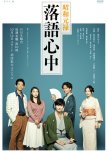This review may contain spoilers
Art or life? Choose! Why?
NB: Thank you for the brilliant subs evasive subs!
I discovered rakugo. I never knew it existed and one episode was enough for me to spend an hour on the internet trying to find out as much as I can about this art. And I discovered many interesting things and not only on wikipedia!
First : the lesson! (LOL!)
Rakugo (落語, literally 'story with a fall')[1] is a form of Japanese verbal entertainment, traditionally performed in yose theatres.[2] The lone storyteller (落語家, rakugoka) sits on a raised platform, a kōza (高座). Using only a paper fan (扇子, sensu) and a small cloth (手拭, tenugui) as props, and without standing up from the seiza sitting position, the rakugo artist depicts a long and complicated comical (or sometimes sentimental) story. The story always involves the dialogue of two or more characters. The difference between the characters is depicted only through change in pitch, tone, and a slight turn of the head. The monologue always ends with a narrative stunt (punch line). Rakugo has been described as "a sitcom with one person playing all the parts". Around 1670 in the Edo period (1603–1867), three storytellers appeared who were regarded as the first rakugoka. (wikipedia)
Second: the plot!
This drama was gripping from the first to the last minute! It tells the story of Bou, a young boy whose dancing career had been ruined and who is sent over to a master rakugoka to learn the craft of storytelling. He meets Sukeroku the first day there and they become fast friends in spite of completely opposite characters. The drama tells the story of their lives over a period of 60 years which covers Showa era (from approximately 1933 to 1997 with the epilogue 16yrs later!). The boys change names as they grow and get promoted within the rakugo association.
I used to watch a lot of western dramas with this kind of basic plot: story of one character's life practically from cradle to grave, spanning a long period of history when major changes happened. Since I usually avoid asian historical dramas as if they were plague, I have never seen an asian version of these life stories. I loved this one, it was gripping, but it tugged at my heartstrings too much in the last episode so I shall probably never watch anything like this again. Too painful in spite of them trying to be upbeat about main character dying of old age!
The plot describes the fight, very restrained and civilized, between the holders of the tradition (masters) and those who try to bring a bit to modernity into strictly coded art (Sukeroku). Yakoumo(Bou) is torn between the safety of known rules and codes and the admiration for the freedom and originality of Sakuroku's performance. And even though for a short moment Yakoumo felt jealous of his friend, he quickly accepted that his art is different, classical not as exciting as Sakuroku's but still admirable. The bond between those two people was unbreakable, they loved and cherished each other immensely and no matter what the world thought , they were there for each other. This was a real bromance!
The problems start when Yakoumo falls for a geisha. When his master asks him to choose between her and rakugo, he breaks up with her. She consoles herself with Sukeroku who was banished from rakugo for insubordination and everything leads to a tragedy with consequences felt for a long time afterwards. This was never really a love triangle and they showed it clearly. The rules and hidden envies ruined lives of three people who starting from that moment just survived and not lived.
The plot is tightly woven and there are no plot holes. The characters are clearly presented and they are fully fleshed out: we follow their growth over a long time period.
Third: the production.
Since this drama is a life story, there are a lot of time jumps so the extraordinary actor, Okada Masaki, first and foremost, had to play the character between the ages of 17 and 70 which is a no mean treat. The way he changed voice and posture and attitude with age is impressive. The actors also had to learn all the rakugo tales and codes of performance as well. Amazing. The only problem i had was the ageing make up (which was expertly done, no details were missed- like hands or neck.): the character who is supposed to be 70 looks more like he's 95, he looks too old for his age. Maybe it has to do with the personality of the character: dry, succinct, cold, unhappy, bitter, restrained so he looks older than he should?
The music is just perfect, with enough pathos to tug at your heart. The time period was rather faithfully recreated.
Conclusion
Drama is about rakugo, an art form thought to be on the decline but still alive and kicking and the people preforming it. it is about people in doing rakugo. As I said, I'd never heard of rakugo before this drama, but it is still easy to follow since it is a human story. Beautifully told story of people trying to overcome obstacles put before them by society, rules and prejudice. Sorry, this review is a bit messy...
I discovered rakugo. I never knew it existed and one episode was enough for me to spend an hour on the internet trying to find out as much as I can about this art. And I discovered many interesting things and not only on wikipedia!
First : the lesson! (LOL!)
Rakugo (落語, literally 'story with a fall')[1] is a form of Japanese verbal entertainment, traditionally performed in yose theatres.[2] The lone storyteller (落語家, rakugoka) sits on a raised platform, a kōza (高座). Using only a paper fan (扇子, sensu) and a small cloth (手拭, tenugui) as props, and without standing up from the seiza sitting position, the rakugo artist depicts a long and complicated comical (or sometimes sentimental) story. The story always involves the dialogue of two or more characters. The difference between the characters is depicted only through change in pitch, tone, and a slight turn of the head. The monologue always ends with a narrative stunt (punch line). Rakugo has been described as "a sitcom with one person playing all the parts". Around 1670 in the Edo period (1603–1867), three storytellers appeared who were regarded as the first rakugoka. (wikipedia)
Second: the plot!
This drama was gripping from the first to the last minute! It tells the story of Bou, a young boy whose dancing career had been ruined and who is sent over to a master rakugoka to learn the craft of storytelling. He meets Sukeroku the first day there and they become fast friends in spite of completely opposite characters. The drama tells the story of their lives over a period of 60 years which covers Showa era (from approximately 1933 to 1997 with the epilogue 16yrs later!). The boys change names as they grow and get promoted within the rakugo association.
I used to watch a lot of western dramas with this kind of basic plot: story of one character's life practically from cradle to grave, spanning a long period of history when major changes happened. Since I usually avoid asian historical dramas as if they were plague, I have never seen an asian version of these life stories. I loved this one, it was gripping, but it tugged at my heartstrings too much in the last episode so I shall probably never watch anything like this again. Too painful in spite of them trying to be upbeat about main character dying of old age!
The plot describes the fight, very restrained and civilized, between the holders of the tradition (masters) and those who try to bring a bit to modernity into strictly coded art (Sukeroku). Yakoumo(Bou) is torn between the safety of known rules and codes and the admiration for the freedom and originality of Sakuroku's performance. And even though for a short moment Yakoumo felt jealous of his friend, he quickly accepted that his art is different, classical not as exciting as Sakuroku's but still admirable. The bond between those two people was unbreakable, they loved and cherished each other immensely and no matter what the world thought , they were there for each other. This was a real bromance!
The problems start when Yakoumo falls for a geisha. When his master asks him to choose between her and rakugo, he breaks up with her. She consoles herself with Sukeroku who was banished from rakugo for insubordination and everything leads to a tragedy with consequences felt for a long time afterwards. This was never really a love triangle and they showed it clearly. The rules and hidden envies ruined lives of three people who starting from that moment just survived and not lived.
The plot is tightly woven and there are no plot holes. The characters are clearly presented and they are fully fleshed out: we follow their growth over a long time period.
Third: the production.
Since this drama is a life story, there are a lot of time jumps so the extraordinary actor, Okada Masaki, first and foremost, had to play the character between the ages of 17 and 70 which is a no mean treat. The way he changed voice and posture and attitude with age is impressive. The actors also had to learn all the rakugo tales and codes of performance as well. Amazing. The only problem i had was the ageing make up (which was expertly done, no details were missed- like hands or neck.): the character who is supposed to be 70 looks more like he's 95, he looks too old for his age. Maybe it has to do with the personality of the character: dry, succinct, cold, unhappy, bitter, restrained so he looks older than he should?
The music is just perfect, with enough pathos to tug at your heart. The time period was rather faithfully recreated.
Conclusion
Drama is about rakugo, an art form thought to be on the decline but still alive and kicking and the people preforming it. it is about people in doing rakugo. As I said, I'd never heard of rakugo before this drama, but it is still easy to follow since it is a human story. Beautifully told story of people trying to overcome obstacles put before them by society, rules and prejudice. Sorry, this review is a bit messy...
Was this review helpful to you?


 4
4


